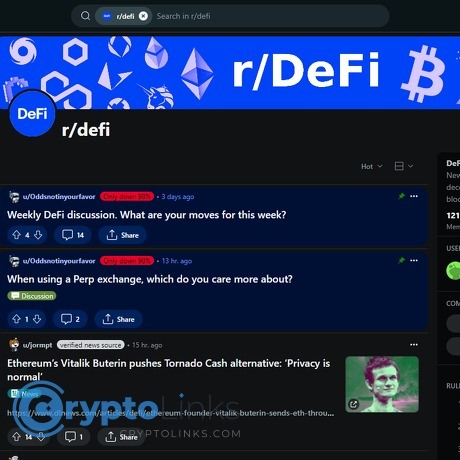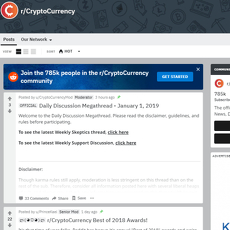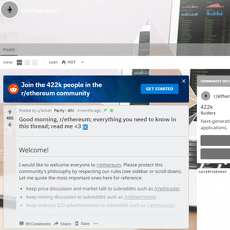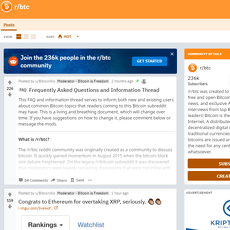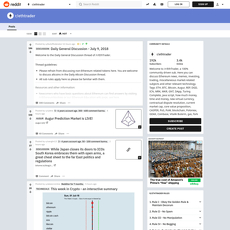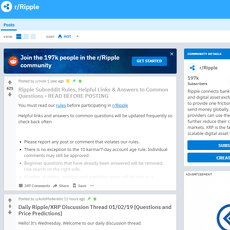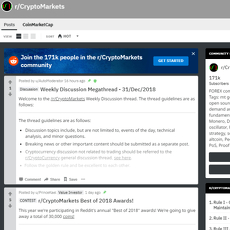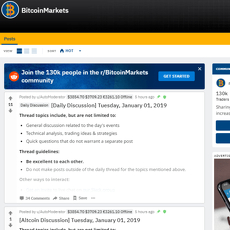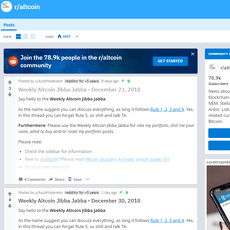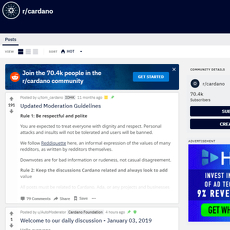r/defi Review
r/defi
www.reddit.com
r/defi Review & Guide: Everything You Need to Know (+FAQ) for 2025
Are you scrolling through r/defi and wondering what’s real, what’s hype, and what’s flat-out risky? You’re not alone. The subreddit can be a goldmine, but only if you know how to use it without getting lost in threads or nudged into a bad click.
In this guide, I’ll show you how I treat r/defi like a research tool, not a time sink—how to spot useful conversations fast, avoid traps, and get clear answers to the questions that actually matter in 2025.
The common headaches when using r/defi
Let’s be honest about why r/defi can be frustrating:
- Endless threads and conflicting advice. One post says “use this bridge for the lowest fees,” another says the opposite. A “Research” flair might be a thoughtful deep-dive—or a thinly veiled promo.
- Shills and fake support comments. You’ll see “contact support at [number]” replies or “DM me to unlock your funds.” These are classic scams Reddit warns about in their scam safety notes.
- Risky links and rushed calls to action. Shortened URLs to “exclusive airdrops,” unofficial token contracts, or apps asking for unlimited approvals. One bad signature and you’re stuck revoking permissions for weeks.
- Information age is all over the place. A great thread from last year might be wrong today after fee changes, new bridges, or post-upgrade shifts (think Ethereum’s EIP-4844 changing L2 economics).
- Basic questions get fragmented answers. Cashing out, taxes, wallet safety—lots of replies, little context, and not always updated with current tools or policies.
Real talk: independent security firms consistently note that crypto users lose funds to phishing and approval-based scams as much as big protocol hacks. If you want a grounding read, the Chainalysis Crypto Crime Reports lay out the trends year by year (Chainalysis blog). The takeaway is simple—most losses don’t come from being “unlucky,” they come from being rushed.
Here are a few patterns I see on r/defi all the time:
- The “helpful support” reply: A new account posts a WhatsApp number to “fix” your MetaMask. Ignore it. MetaMask’s own safety page warns about this exact playbook (MetaMask phishing tips).
- The “too good to be true” APY thread: A fresh account pushes a new farm with a shortened link. No audit link, no docs, no explorer address. That’s a no from me until verified.
- The confident but outdated answer: Someone suggests an old bridge flow that was cheap last year but is now more expensive or less secure after upgrades and policy changes. Without dates and sources, “confidence” is not a signal.
Rule of thumb: if a claim isn’t sourced, it’s an opinion. If a link isn’t official, it’s a risk.
What this guide will solve for you
I built a simple way to use r/defi as a research hub—not a doomscroll feed. Here’s what you’ll get from this guide:
- A practical workflow to find signal fast—without opening 25 tabs you’ll never read.
- Quick safety checks that catch the obvious traps (fake support, scam airdrops, shady approvals) before you click.
- Clear, no-nonsense answers to the questions that come up every week on the sub: cashing out, legality, safety, and making money—compiled into a focused FAQ.
Think of it like upgrading your “r/defi reader brain” with a few repeatable habits that compound over time.
Who this is for and how to get the most out of it
This is built for two types of readers:
- Curious beginners who want to participate safely without clicking the wrong link.
- Regulars who already hang out on r/defi but want a faster way to separate real insights from noise.
Here’s how to make the most of what’s ahead:
- Use a timer. Give yourself 15–20 minutes per session. If a thread doesn’t earn your attention in 60 seconds, move on.
- Start with quality filters. Sort by Top (Week/Month) before New. Then scan comments for sources, not slogans.
- Keep a tiny note. Track 3 things: trusted commenters, verified resources, and “open questions” to revisit. You’ll be amazed how fast this compounds.
And to set expectations:
- r/defi is great for sentiment, discovery, frameworks, and real user experiences.
- r/defi is not great for precise help with your wallet, taxes, or legal setup. You’ll still verify with official docs and trusted tools.
If that sounds like the kind of edge you want when you open Reddit, you’re in the right place. Ready to see how the subreddit actually works, who it’s for, and the vibe you should expect before you jump in?
What r/defi is, who it’s for, and the vibe
r/defi is Reddit’s open floor for decentralized finance: news, new launches, risks, real user experiences, and strategy talk. On any given day, I’ll see smart contract threads next to wallet basics and practical “how do I move funds safely?” questions. It’s a place to sample market mood and hear how people are actually using protocols—not a place to get financial advice.
Expect the tone to swing. One thread might unpack validator economics or intent-based order flow; the next might be a newcomer asking which wallet to use or how to handle approvals. That mix is the point: it’s a living feed of curiosity, skepticism, and pattern-spotting.
“In DeFi, speed is a cost. Patience is protection.”
I treat it as a sentiment and discovery layer. When debates flare up—restaking risk, L2 decentralization timelines, bridge safety, stablecoin choices—you’ll usually see them here fast, with users dropping code links, Dune dashboards, and post-mortems. Just remember: strong opinions are common; strong sources are rarer.
Key rules, flairs, and post types you’ll see
Flairs are your friend. They’re the fastest way to home in on what you want:
- Discussion — Opinionated, useful for frameworks. Example: “Are AVSs concentrating risk?”
- Question — Clear asks. Example: “Best route to move USDC from Base to mainnet?”
- Research — Deep dives and sources. Example: “Dune panel of LSD/LRT flows with methodology.”
- Risk — Incidents, warnings, trade-offs. Example: “Unlimited approval exploit breakdown + how to revoke.”
- News — Releases and upgrades. Example: “Protocol X adds OP stack; what changes?”
Moderators actively discourage low-effort shilling, referral spam, and fake “support” replies. If someone comments, “DM me to fix your wallet,” that’s not help—hit report. This isn’t paranoia; open forums attract scammers, and crypto crime data shows social-engineering tricks remain common vectors. If you’re curious, the Chainalysis Crypto Crime Reports detail how scammers weaponize links and impersonation across social platforms. Treat unverified offers like pop-ups on a sketchy site—close the tab.
One more note on expectations: social feeds blend expertise with guesswork. Pew Research has shown for years that social platforms deliver both useful and misleading information. On r/defi, I assume every claim is a hypothesis until it comes with receipts.
How I quickly scan the subreddit
I keep a short, repeatable routine that balances quality with freshness:
- Sort by Top (Week/Month) to see what earned attention and (usually) better comment vetting.
- Switch to New for trend-spotting: early alerts on exploits, upgrades, or narrative pivots.
- Check Controversial when I want pushback and edge cases—it’s great for finding blind spots.
- Use Google with operators for cleaner results: site:reddit.com/r/defi restaking risks, site:reddit.com/r/defi bridge exploit, site:reddit.com/r/defi stablecoin depeg. Add time filters (Past month) to keep it current.
When a post looks promising, I open it and scan the top comments before reading the full thread. I’m hunting for:
- Context — “Here’s how this compares to 2023 when we had X issue.”
- Primary sources — GitHub commits, audits, docs, explorer links, or dashboards.
- Rebuttals — A sourced counterpoint beats ten upvotes. If nobody challenges the main claim, I’m cautious.
Examples that consistently surface signal:
- “What actually causes impermanent loss?” threads where commenters link to calculators and show LP PnL with fee data.
- “Is this a real airdrop?” posts where someone posts the contract address and a block explorer screenshot instead of a referral link.
- “Sequencer decentralization timelines” debates that include governance proposals and public roadmaps, not just vibes.
When r/defi works best—and when it doesn’t
Works best for:
- Learning frameworks — LP vs. hedged LP, borrow/lend health checks, restaking trade-offs.
- Real user experiences — UX pain points, fees, slippage, quirks that docs don’t mention.
- Early debates — You’ll hear the “why it could break” case here before it hits headlines.
Not ideal for:
- Precision tasks — Stuck transactions, tax specifics, or exact contract parameters. That’s what official docs, explorers, and tax tools are for.
- Personal support — If your funds are stuck, random DMs won’t help. Use official channels only.
- One-size-fits-all answers — Risk tolerance and jurisdictions vary. Look for principles, not prescriptions.
If you want to turn this feed into a reliable research ally without losing hours, the next step is simple: want my 10‑minute routine that turns three threads into real, verifiable takeaways you can act on today?
A simple workflow to get signal from r/defi
I treat r/defi like a lab notebook, not a casino lobby. The goal is to move fast without breaking your wallet. Here’s the repeatable loop that keeps me from getting pulled into 40-comment rabbit holes: search → scan flairs → read top comments → verify with sources → bookmark. It sounds basic, but the discipline is what saves time—and money.
“In DeFi, screenshots are marketing; on-chain data is truth.”
Why this matters: open forums amplify both brilliance and bad takes. Chainalysis has shown in its 2024 Crypto Crime Report that social platforms remain a common distribution channel for scams and misinformation. That’s not to scare you—it’s the reminder to always run claims through your own checks before you click anything.
Search and filter like a pro
Reddit’s native search isn’t great. I stack it with Google and a little flair magic to surface useful threads quickly.
- Start with targeted keywords + flair:
- “impermanent loss flair:Discussion” – surfaces frameworks and calculators people actually use
- “bridge risk flair:Research” – pulls risk write-ups, incident post-mortems, and audits
- “stablecoins flair:News” – tracks depegs, reserve changes, and policy news
- Use Google for precision: try site:reddit.com/r/defi bridge risk, then add time filters (Tools → Past month) to avoid outdated advice.
- Sort smart:
- Top (Week/Month) for consensus and higher-signal posts
- Controversial to find pushback and edge cases (gold mine for risk notes)
- New for fresh events you’ll want to verify fast
- Read top comments before anything else: I look for sourced replies, counterarguments, and links I can audit. Unsourced “alpha” gets a mental red flag.
Real-world sample: Someone posts “30% APR on XYZ staking, zero risk.” I’ll search “XYZ staking flair:Discussion” and “XYZ emissions flair:Research”, then sort by Controversial. If veterans are calling out token inflation or cliff unlocks, I’ve just saved myself a future headache.
Verify before you act
This is where most people either win or blow up. I never move funds based on a single thread. I confirm claims with first-party data, then look for independent support.
- Check contracts and activity on-chain:
- Open the contract on Etherscan (or the right explorer). Confirm the official address from a project’s website/X/Docs before you paste any address.
- Skim Read/Write tabs, recent Transactions, and Events. Weird minting patterns or new proxy implementations? Pause.
- Validate metrics with public dashboards:
- DeFiLlama for TVL changes, fees, yields, and token emissions context
- Dune for community-built dashboards (look for multiple dashboards agreeing on the same metric)
- TokenTerminal for protocol revenues and fundamentals
- Audit the “safety” claims, not just the code:
- Find audit links on the project’s docs. Check date, scope, and open issues. A 2021 audit for a 2025 V3 contract? That’s not an audit for what you’re using.
- Search the project name + “bug bounty” and look on Immunefi. Is there an active bounty? Any past disclosures or patches?
- Cross-check market claims:
- For stablecoin worries: compare prices across multiple markets and chains; check issuer status pages when available.
- For “riskless” yields: identify the source—trading fees, token emissions, MEV rebates, or lending spread. If the source is emissions, expect decay.
- Weigh the messenger:
- New account + strong claims + no sources = treat as unverified.
- Commenters who post tx hashes, docs, and consistent reasoning get more weight in my notes.
Quick example checklist:
- Claim: “Bridge ABC is the safest route for L2 → L1.”
- I do: confirm the canonical bridge from the L2’s docs; open ABC’s contracts on the correct explorer; check recent incidents on their blog/X; compare fees and times on DeFiLlama’s bridges section; scan r/defi threads for incident reports and read the top dissenting comments.
- Result: either greenlight with limits, or I switch to the official bridge and note why.
Why I’m strict here: Immunefi’s ongoing 2024 reporting shows exploit patterns concentrate in bridges, wallets, and protocol upgrades. If a post involves any of those areas, I require double confirmation before I act.
Save and organize what you learn
The win condition is turning forum noise into a personal knowledge base you can trust. I keep it simple and consistent.
- Use Reddit’s “Save” + your own notes: After I save a high-signal thread, I add a 1–2 sentence takeaway in my notes app with:
- Link + date
- One-line insight (e.g., “LPing volatile pairs = implicit short gamma; hedge or size down”)
- Contracts or dashboards referenced
- Trust signal (sourced comments? known researchers?)
- Status: unverified, verified, or debunked
- Create reusable search bookmarks:
- Google: site:reddit.com/r/defi “impermanent loss” (Past year)
- Reddit: flair:Research bridges sorted by Top (Month)
- Track trusted voices: Keep a short list of commenters who always bring sources. When they post, I read. When they disagree, I pay extra attention.
- Archive the good stuff: Save links to Wayback Machine or your knowledge base in case edits or deletions happen. For technical docs, I mirror PDFs so I can annotate.
- Set follow-ups: On Reddit, ping u/RemindMeBot with “RemindMe! 7 days ‘recheck ABC emissions’.” It’s a small habit that catches many “looks good today, bad next week” situations.
When this system runs, r/defi stops being a time sink and becomes a radar. You’ll spot narratives early, pressure-test them fast, and build a living map of what’s real in the market.
One last thought before we keep going: a clean workflow is only half the battle. The other half? Knowing what not to click. Want the exact red flags I scan for in threads—before I even hover over a link?
Trust and safety: how to avoid scams on r/defi
Most people don’t get wrecked by zero-day exploits—they get hurt by clicking the wrong link, signing the wrong message, or trusting the wrong comment. Slow is smooth. If a tab is screaming “act now,” close it. You’ll never miss a legit opportunity that can’t wait five minutes.
“Amateurs hack systems; professionals hack people.”
— Bruce Schneier
That quote sits on a sticky note by my screen. It reminds me that on the internet (and especially in crypto), the attack surface is usually our attention and our emotions, not just our wallets.
Red flags to watch for
- “Support” phone numbers or DMs in comments
Sample script: “Hey, I’m with MetaMask/Uniswap support—call this number or DM me to recover your funds.”
No legit team fixes wallets via phone or Reddit DMs. Report and move on.
- Airdrop bait and fake claim sites
If a “claim” link isn’t on the project’s official site or verified social channels, assume it’s a drainer. Lookalike domains (unlswap[.]app, app-uniswap[.]io) are common.
- Fake token contracts in comments
Shills reply with a contract address that’s one character off the real one. Always fetch contract addresses from the project’s official docs or GitHub, then verify on a known explorer (e.g., Etherscan).
- Shortened links and stealth redirects
Bitly/tinyurl hides the destination. Expand them with a link expander first or ignore them entirely. On desktop, hover to preview; on mobile, don’t tap.
- Unlimited approvals and blind signatures
Prompts like “SetApprovalForAll”, “Permit”, or broad “Spend Unlimited” requests from unknown dApps are common drainer tactics. If you don’t fully understand the permission, cancel. Wallets that simulate transactions help a lot here.
- “Urgent unlock” and “bridge recovery” schemes
Scammers claim they can unlock stuck funds if you send them gas or “temporary access.” That’s a one-way ticket to a drained wallet.
- WalletConnect pop-ups out of context
A random site triggers a QR prompt with vague wording? Back out. Only connect from links you initiated from official pages.
- New accounts pushing the same link
Low-karma or very recent accounts repeating a URL across threads is classic astroturfing. Check their history; it takes seconds and saves money.
Context: security firms have been ringing the alarm on wallet-drainer kits for a while. Chainalysis has noted social engineering and phishing remain consistent scam vectors in their crime reports (source), and independent monitors have tracked hundreds of millions lost to drainer-based phishing in recent years. The pattern is simple: trick you into signing once, empty the bag later.
Safe habits that actually work
- Quarantine your browsing
Use a separate browser profile for crypto. Minimal extensions. Bookmark official links, and only navigate from those bookmarks. It cuts 90% of “oops” clicks.
- Use a read-only or burner wallet for exploration
For browsing new tools or links from threads, connect a wallet with no funds. Keep your main assets in a hardware wallet you never connect to random sites.
- Revoke approvals regularly
Check and prune token allowances monthly or after trying a new dApp:
- Revoke.cash
- Etherscan Token Approval Checker
Prefer custom spend limits over “unlimited” when a dApp supports it.
- Verify contracts at the source
Pull addresses from the project’s official site, docs, or GitHub. Cross-check on an explorer (e.g., Etherscan for Ethereum, Solscan for Solana). If you can’t find a source, don’t interact.
- Upgrade your wallet UX
Use wallets or extensions that show human-readable transaction simulations and flag risky permissions. If your wallet can’t explain what you’re signing, you’re flying blind.
- Disable blind signing on hardware
Only enable it per case and turn it off after. Always match the address and amount on the device screen; that tiny step prevents huge mistakes.
- Never share seed phrases or screens
No support agent needs your seed. Don’t screen-share your wallet. If someone asks, they’re not support.
- Protect your recovery
Store your seed securely (offline, metal backup if possible). Consider passphrase-protected hardware wallet setups if you understand the responsibility.
- Have an incident plan
If you sign something sketchy:
- Instantly move funds to a fresh wallet with a new seed.
- Revoke approvals on all tokens you used.
- Rotate any exposed API keys and review connected dApps.
Fast reactions can turn a disaster into a scare.
One small but powerful habit: before interacting with anything you found in a thread, ask yourself, “What exact permission is this asking for, and can I reverse it?” If you don’t know, stop and research it first. Pressure is the attacker’s best friend.
Comment-reading hygiene
- Prioritize specifics over vibes
Comments that include contract addresses, audit links, tx hashes, or official docs deserve more weight than “to the moon” or “this is dead” takes.
- Check the messenger
Click the profile. Is the account brand new? Do they post the same link everywhere? Do they participate in other technical or helpful threads? Low-effort histories = low trust.
- Look for dissent and rebuttals
Sort by “Top” and then scan “Controversial.” Good info can come from disagreement. If no one can answer basic risks, that’s telling.
- Ask for on-chain receipts
“Show the tx.” If a claim can’t be supported with a transaction, repo commit, audit reference, or explorer data, treat it as unverified.
- Beware of coordination
Repeated phrasing, identical talking points across fresh accounts, or a sudden wave of “this solved my problem” replies under a sketchy link are classic astroturf signals.
For extra context, security reports have repeatedly shown that social engineering beats pure code exploits for everyday users. The fix isn’t paranoia; it’s procedure. A few boring habits—separate wallets, source verification, approval hygiene—neutralize most traps you’ll meet in the wild.
Quick emotional checkpoint: If you feel FOMO, anger, or panic, you’re being manipulated. Close the tab, stand up, breathe, and come back when you can read the prompt on your hardware wallet without your heart racing.
Now that you can spot the traps, the next questions are the practical ones everyone asks: how do you cash out safely, what’s legal, and what’s realistic for beginners? Ready for straight answers with zero fluff?
r/defi FAQ: straight answers to popular questions
I see the same questions almost every week on r/defi. Here’s how I answer them when I want to help someone fast, without sending them down a rabbit hole.
“Slow is smooth, smooth is fast.” In DeFi, moving carefully is how you actually move faster.
How do I get my money out of a DeFi wallet?
Two clean options:
- Send to a centralized exchange (CEX) you trust (Coinbase, Kraken, Binance, etc.), sell to fiat, then withdraw to your bank.
- Use a regulated on/off-ramp (Ramp, MoonPay, Transak, Coinbase Pay) that connects to your wallet and pays out to card or bank.
Here’s the exact flow I use when someone’s stuck:
- Check the network match: If your USDC is on Arbitrum but your exchange only supports Ethereum mainnet for that token, either bridge it to mainnet or swap to a supported asset/network first.
- Confirm the token version: Some exchanges only support native USDC, not “.e” versions. Verify the contract address from the exchange’s deposit page or the project’s official site.
- Send a $5 test first, then the full amount. Always.
- Watch for memo tags on certain coins (XRP, ATOM, XLM). Missing a memo can strand funds.
- Sell to fiat on the exchange and withdraw via ACH/wire. Expect KYC/AML checks and potential holds if it’s your first time.
Hard rule: anyone posting a phone number or “DM me” to “help you withdraw” is trying to scam you. Stick to official links and support portals. For sanity checks, load the contract on an explorer (Etherscan, Arbiscan) and confirm the token matches what your exchange lists.
Real example: You hold ETH on Arbitrum and want fiat. Coinbase supports ETH deposits from Arbitrum. Copy your Arbitrum ETH deposit address on Coinbase, send a small test, verify it arrives, then send the rest, sell for USD, and withdraw to your bank. No bridges, no stress.
Is DeFi legal in the US?
Using DeFi protocols isn’t broadly banned in the US, but how you use them matters. You’re responsible for complying with tax laws, sanctions rules, and any KYC requirements when you use certain services.
- Taxes: Swaps, sales, and rewards typically trigger taxable events. See the IRS virtual currency guidance and Revenue Ruling 2023-14 on staking rewards as income when you have control. Links:
IRS virtual currency and
Rev. Rul. 2023-14.
- Sanctions/OFAC: Interacting with sanctioned addresses or mixers can create legal risk. Review OFAC guidance and avoid tools flagged in enforcement actions.
- Front-ends vs. protocols: Some US-facing UIs restrict access to certain features or add KYC checkpoints. The underlying contracts may still be accessible, but that doesn’t remove your compliance obligations.
Regulation evolves. If you’re moving meaningful amounts or running a business, talk to a crypto-savvy attorney or CPA.
Is DeFi safe for beginners?
It can be used safely, but it’s not “set and forget.” The biggest risks I see:
- Smart contract bugs and exploits (including bridges)
- Rug pulls and governance takeovers
- Phishing, malicious approvals, and wallet-draining sites
- User mistakes (wrong network, wrong token, missing memos)
Recent data points to why caution pays off: security firms tracked billions in losses from hacks and scams annually, with bridges and governance exploits being frequent culprits. See reports from Immunefi and Chainalysis for context.
Practical guardrails I actually use:
- Start tiny ($10–$50) until you can execute the full flow without friction.
- Hardware wallet for savings; a separate hot wallet for experimenting.
- Verify contract addresses from official docs/X/GitHub. Never from a random comment.
- Read-only mode for browsing apps; connect the signing wallet only when needed.
- Revoke risky approvals regularly, especially after testing new apps.
Can you make money with DeFi?
Yes, but every yield has a risk attached. The playbook is simple: focus on risk-adjusted returns, not screenshots of APY.
- Staking: Blue-chip staking yields are usually single-digit and variable. Smart contract and validator risk apply.
- Lending/borrowing: Earn by supplying assets; risk includes bad debt and liquidation if you borrow against collateral.
- Liquidity provision (LP): You earn fees and incentives, but face impermanent loss when prices move.
- Structured strategies: Vaults, restaking, perps funding capture—complexity can hide stacked risks.
Quick reality check: If an LP pair moves 2x in price, an LP can face around 5–6% impermanent loss before fees/incentives. Use an IL calculator to model moves before you commit.
What works for me:
- Size positions so a worst-case drawdown doesn’t wreck your base stack.
- Prefer transparent protocols with audits, bug bounties, and real revenue, not just token emissions.
- Track net returns after gas, slippage, and potential IL—not just headline APY.
Bonus quick hits I see often
- “Best wallet?” Keep two:
- Hardware wallet (Ledger, Trezor, Keystone) for long-term holdings.
- Hot wallet (Rabby, MetaMask) for testing and daily use. Separate them.
- “Impermanent loss?” It’s the difference between holding tokens vs. being an LP when prices move. It can erase yield if volatility is high. Learn it before you LP. Use fee-tier pools that match expected volatility.
- “Taxes?” In many jurisdictions:
- Swaps/sales → capital gains/losses.
- Staking/yield rewards → usually income when received (US: see IRS Rev. Rul. 2023-14).
- Tracking is everything. Consider tools like Koinly, CoinTracker, Accointing, or CoinLedger.
- “Stablecoin safety?” Check issuer transparency, chain support, and blacklisting policy. USDC/USDT are widely supported; some algo stables have failed spectacularly.
- “Gas too high?” Use L2s (Arbitrum, Optimism, Base, zkSync) and batch actions. Schedule transactions during low-traffic hours.
If you want to turn these answers into a repeatable setup—with the exact explorers, approval checkers, analytics, and tax trackers I rely on—shall we open the toolbox next?
Tools, resources, and smart alternatives to pair with r/defi
r/defi is great for gut-checking sentiment and finding fresh ideas. But I never act on a thread until I’ve checked the numbers, read the code notes, and seen where the risks actually sit. Here are the exact tools I pair with Reddit so I’m not operating on vibes.
Research tools I actually use
Data (TVL, fees, fundamentals)
DeFiLlama — my TVL, fee, and chain-hopping radar.
- Quick check: open a protocol page, toggle chains, then compare “Fees” vs “Incentives/Emissions.” If incentives dwarf fees, that “yield” might be subsidized and likely won’t last.
- Example: before aping into a new pool, I check its parent protocol’s TVL trend across the last 90 days. Flat or falling TVL + rising incentives is often a warning light.
Dune — community dashboards for on-chain reality.
- How I use it fast: search the project name + “volume,” “users,” or “retention.” Save 2–3 dashboards that track core health (e.g., active addresses, fees, emissions).
- Pro tip: sort dashboards by “Most Favorited.” It’s a shortcut to what quants and analysts keep open.
Token Terminal — fundamentals in one place.
- What I look for: revenue, P/F ratios, fee trends, and whether tokenholders have a real claim on value or it’s just narrative. Revenue up, token utility unclear? I treat it as “interesting, not investable” until the value capture is proven.
- Example: comparing L2s: if fees and users trend up but sequencer revenue is concentrated in a single entity, I tag it “execution risk” in my notes.
Security (explorers, approvals, audits, disclosures)
Block explorers — verify addresses and interactions where it matters.
- Etherscan, Arbiscan, BaseScan, Snowtrace (and equivalents for your chain).
- Three-click sanity check: 1) open the contract from the official docs only, 2) check “Contract” tab is verified, 3) if it’s a proxy, click “Read as Proxy” and inspect the implementation address + recent admin calls.
- Bonus: add the token to your personal Watchlist on Etherscan to get alerts for abnormal mint/burn patterns.
Approval revokers — clean up “god-mode” allowances before they bite.
- revoke.cash, Unrekt, Etherscan Token Approvals.
- My habit: calendar reminder every two weeks to revoke high-risk approvals and set “spend limit” when possible instead of unlimited.
- Why it matters: multiple security firms (Chainalysis, Immunefi, CertiK) have shown billions lost across 2022–2024, with DeFi exploits and bad approvals a recurring theme. Reducing allowances cuts a big chunk of tail risk.
Audit portals and disclosures — see what the engineers actually found.
- CertiK Skynet, Code4rena reports, Trail of Bits blog, DeFiSafety, Immunefi bounties, Rekt.news, SlowMist.
- Quick read: scan “open issues,” severity tags, and whether criticals were fixed or just acknowledged. If a project waves away medium/high findings pre-launch, I pass.
- After incidents: Rekt/SlowMist post-mortems help me understand the failure mode so I don’t repeat it elsewhere (bridges and oracles remain the usual suspects).
Tracking (portfolio, exposures, alerts)
DeBank, Zerion, Zapper, Rotki
- Use-cases: DeBank for fast wallet and approvals overview, Zerion/Zapper for cross-chain positions, Rotki for privacy-first accounting and tax tracking.
- Workflow: set a “cold” watch-only wallet for browsing and a “hot” wallet for testing. Track both so your approvals and exposures are always visible.
Watchlists and alerts
- Etherscan/Basescan address alerts for whale moves or contract upgrades.
- Tenderly or wallet-native alerts (e.g., Rabby) for suspicious approvals, newly added spenders, or gas spikes.
- Simple rule: if I can’t monitor it, I scale it down or exit. Alerts are cheap insurance.
LP-specific helpers
- APY.Vision to visualize impermanent loss and fee income before I add liquidity.
- Reality check: if historical fees don’t compensate for plausible price swings, I skip the pool regardless of APR banners.
Shortcut I use: r/defi for the idea → DeFiLlama for the footprint → Dune for usage → Token Terminal for economics → Etherscan for safety → revoke approvals if I tested anything and I’m done.
Related communities and reading
- Subreddits: r/ethfinance, r/ethereum, r/cryptocurrency, plus project-specific subs for the protocols you actually use.
- Official docs + GitHubs: Always start here. Docs should link to the exact contract addresses, audits, and changelogs. GitHub releases and commit history tell you whether the thing is actively maintained or in maintenance mode.
- Security and research blogs: Trail of Bits, OpenZeppelin, ChainSecurity, Paradigm’s research posts, and post-mortems on Rekt/SlowMist. A single afternoon reading real incident write-ups will save you from 80% of rookie mistakes.
Why I’m so picky: independent reports across 2022–2024 show DeFi exploits dominate crypto hacks by value. The pattern is consistent: bridges, oracles, upgradeable proxies, and sloppy permissioning. Using the tools above turns those unknowns into checkboxes you can actually verify.
Want a 10-minute setup that ties all of this together into a repeatable “open Reddit → verify → act or pass” routine? That’s exactly what I’m about to show you next.
My verdict on r/defi and how to make it work for you
Used the right way, r/defi is a strong early-warning system and a great place to pressure-test ideas. I use it to sense where attention is shifting, collect frameworks from sharp commenters, and spot risks before they hit headlines. I don’t use it as a trade feed or a source of final answers. If a claim isn’t backed by on-chain data, docs, or code, it’s just noise.
That stance is not paranoia—it’s practical. In 2024 alone, security trackers recorded billions in crypto losses tied to exploits and scams, with DeFi still carrying the bulk of technical risk. See Immunefi’s annual wrap-ups for the scale of losses and attack patterns, and note how bridges and complex protocol linkages keep turning up in incident summaries. Chainalysis has echoed the same trend for years: cross-chain systems and high TVL targets draw attackers. Those two facts are why I treat r/defi as a starting point to ask better questions, not a finish line.
When the community is debating something substantive—restaking mechanics, bridge trust assumptions, stablecoin backing, fee flows—you’ll often find excellent comment chains with references to audits, GitHubs, and dashboards. Those are gold. Threads built on vibes, screenshots, or “act now” language get a hard pass.
When to lean in vs. step back
- Lean in when you see:
- Sourced posts: links to audits, GitHub commits, Dune dashboards, or transaction hashes.
- Clear risk frameworks: admin key details, oracle dependencies, L2/bridge trust models, MEV considerations.
- Governance proposals and parameter change debates with measurable impact (caps, emissions, collateral lists).
- Users reproducing results: how they measured yield, what fees they paid, what approvals they granted.
- Healthy pushback: top comments disagreeing with evidence, not insults.
- Step back when you see:
- “Too good to be true” yields without a source of revenue beyond emissions.
- Fresh accounts posting links, shortened URLs, or “DM/phone support” replies.
- Price targets, countdowns, and fake urgency (“final hour,” “whitelist closes now”).
- Wallets or dapps asking for unlimited approvals with no reason.
- No on-chain or document trail—just graphics and promises.
Quick example of what “lean in” looks like: during the UST/LUNA unwind, the useful posts were the ones linking to Curve pool imbalance data and wallet flows, not pep talks about the peg. That pattern repeats. The best signal in r/defi is almost always the comment with a link you can verify.
References worth bookmarking:
Immunefi loss reports (recurring exploit patterns) and
Chainalysis Crypto Crime reports (macro trends on where attackers focus). Both help you sanity-check whatever narrative is trending in a thread.
A simple action plan for your next session
- Open r/defi and filter by Top (Week). Pick three threads that cite data or docs.
- Read the top comments and one strong dissenting comment for each thread.
- Verify one key claim per thread using a public source:
- Protocol facts: official docs, GitHub, governance forum.
- Numbers: DeFiLlama for TVL/fees, a Dune dashboard, or the block explorer.
- Security: audit links, bug disclosures, or approval revoker checks.
- Add exactly one takeaway to your notes from each thread. If you can’t distill it to a sentence with a link, you didn’t verify it.
- Before you connect a wallet, run a 30-second pre-flight:
- What is the contract address, and where did you get it?
- Who controls upgrades/admin keys? Any timelock?
- Where do yields come from? Fees, emissions, or both?
- What approvals does this action require? Can you cap them?
- Set a 20–30 minute timer. When it rings, either save your notes and stop, or act on a verified plan. No wandering.
Trust the thread to point you. Trust the data to prove it.
If you want a lightweight template, here’s what I paste into my notes app:
- Topic: [Thread title/link]
- Main claim: [One sentence]
- Evidence: [Docs / Dune / Explorer link]
- Risks: [3 bullets max]
- Action: [Wait / Simulate / Monitor / Deploy small test]
Conclusion: learn fast, stay safe, and use r/defi the smart way
r/defi shines when you treat it like a thinking gym, not a signal service. Look for sourced discussions, verify with real data, and keep your wallet permissions tight. That’s how you catch useful narratives early and skip the traps that keep showing up in yearly hack reports. Keep your sessions short, your notes clear, and your actions deliberate. The upside is there—you just need a system to reach it without the headaches.
CryptoLinks.com does not endorse, promote, or associate with subreddits that offer or imply unrealistic returns through potentially unethical practices. Our mission remains to guide the community toward safe, informed, and ethical participation in the cryptocurrency space. We urge our readers and the wider crypto community to remain vigilant, to conduct thorough research, and to always consider the broader implications of their investment choices.

